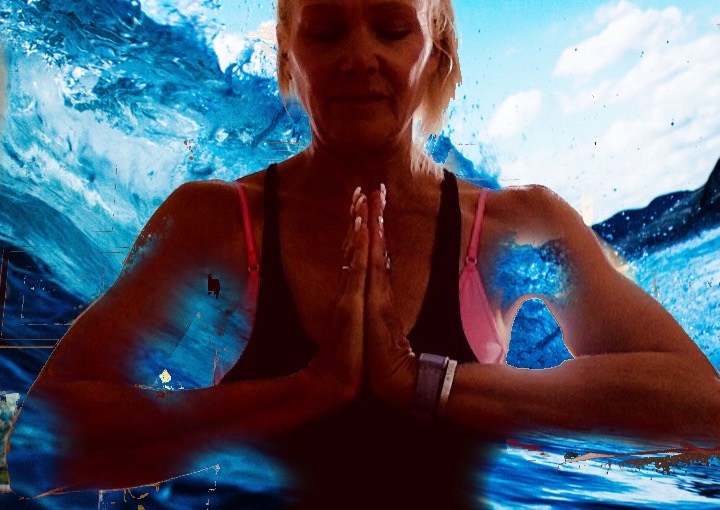Without a doubt, one of the biggest health concerns I hear about from friends, family, and clients is that they are just not getting proper sleep. Either they can’t fall asleep or, once they are asleep, they cannot seem to stay asleep. I, personally, am a lifelong insomniac who knows the struggle first hand. I’ve spent years trying to find what works for me-and that fix usually only lasts a few weeks or months before I’m looking for the next solution. Many turn to over the counter sleep meds which are not to be used regularly, or to herbal remedies which can have odd side effects. There are many different things you can try to get a better night’s sleep including certain foods that can help us drift off a little faster and stay asleep a little longer. These foods, along with some other great heath hacks can help you find that restful night’s sleep that you need and desire.
First-let’s address WHY good sleep is so important in our lives!
The Negative Effects of Not Getting Enough Sleep
Whether you are a “bad” sleeper, or perhaps just someone who’s life just doesn’t allow for much time for sleep, sleep deprivation can have a wide range of negative effects. Unfortunately, the disadvantages of not getting enough sleep are beyond daytime drowsiness and can’t be fixed with a daily dose of caffeine. Lack of sleep can jeopardize your safety and that of others around you or lead to serious health consequences. The following is a list of some surprising negative effects of inadequate sleep.
Faster Aging
Sleep deprivation can affect the way you look and accelerate the aging process. After just a few days of sleepless nights, many people start to develop wrinkles, dull skin and dark circles under the eyes. Much of this is caused by higher levels of cortisol (stress hormone) in the body which become elevated when you don’t get enough rest. When in excess, cortisol breaks down collagen – a protein that keeps the skin smooth, elastic and looking young.
Health Problems
A few nights of missed sleep can be fixed easily with more rest during subsequent days and is unlikely to have long lasting effects on your health. However, when you don’t sleep well for weeks, months, or even years, this will start to take a serious toll on your health and put you at a much higher risk of developing a range of health problems including depression, diabetes, heart disease and high blood pressure.
Increased Risk of Causing Accidents
Lack of sleep causes drowsiness that can increase the risk of accidents when driving, operating machines, and performing various other tasks. Drowsiness slows down your reaction times and this makes it much more difficult to respond when you need to. Therefore fatigue is one of the leading causes of automobile accidents on the roads today.
Poor Mental Performance
If you’re sleep deprived, many of your cognitive responses will not function at peak levels. Your attention span, reasoning, sense of judgment and problem-solving skills will be impaired when the body is not well rested. Lack of sleep also affects the way your brain processes and stores information and you’ll tend to forget things more often. All these factors make performing effectively and productively during the day very difficult.
Weight Gain
It may be hard to believe that not sleeping enough can cause you to pack on some extra pounds. However, recent studies have found that shortened sleep time decreases the levels of leptin (a hormone that suppresses your appetite) in your body while also elevating levels of ghrelin (a hormone that induces hunger). A lack of sleep also reduces your human growth hormone (a hormone that stimulates muscle growth and fat burning) levels that limit the rate at which your body burns fat. The overall result is that if you don’t sleep enough, you’ll be more likely to overeat, and your body will burn off these excess calories at a slower rate.
As you can see, sleep holds a major key to our over health and wellbeing. That said, different people need different amounts of sleep. Some people cannot function on less than 8 hours, while others do just fine with 6. It’s important to be mindful of how you feel during the day. Do you need several cups of caffeine to make it through? Do you find yourself dozing off at your desk mid-day? Do you lack physical and mental energy regularly? If you experience these things, and know you are probably not getting enough sleep, it’s time to make an effort to make some changes.
And Now…The Positive Effects of Sleep
After an uninterrupted sleep session, you should feel refreshed, full of energy and ready to take on the day. The importance of sleep goes beyond boosting your mood and energy levels. In recent years, scientists have gone to great lengths to understand the health benefits that sleep brings. Here are a few awesome benefits of getting decent sleep:
Better Memory
Numerous studies have shown that sleep has a positive effect on your memory and allows the brain to become much better at remembering things. Researchers believe this is the result of a process known as memory consolidation whereby the brain recalls skills learned while you are awake.
Enhanced Concentration
Sleep is like nutrition for the brain. When you get enough of it, the chances of losing concentration during the day are much less. This makes you much more alert while you complete your daily tasks and has a direct positive impact on your effectiveness, productivity, and performance.
Faster Muscle Growth
The body releases growth hormone and builds new muscle cells while you are sleeping. Not only does it renew and revitalize your cells, but it also repairs any tissue damage. This is particularly beneficial if you perform weightlifting workouts, as the intense exercises that make up these workouts tear your muscles slightly so that they can grow back bigger and stronger. Sleep provides your body with the platform it needs to fully repair these torn muscles and maximize your muscle size and strength.
Increased Fat Loss
Researchers have found that getting enough sleep can help you eat less and even accelerate the rate at which your body burns fat. Sleeping helps regulate the levels of ghrelin and leptin in your body – 2 hormones that control hunger and appetite. It also stimulates the production of human growth hormone – the hormone that supports and speeds up your body’s fat burning processes.
Improved Physical Performance
If you’re an athlete who wants to improve your performance, getting good quality sleep every day can help you achieve this goal. Researchers at Stanford University ran a study on college football players who slept for at least 10 hours daily over several weeks. They found that not only did the well-rested athletes increase their average sprint times but also felt less tired and had more stamina during the day.
Reduced Stress Levels
When your body is sleep deprived, it goes into stress mode. Its functions remain on high alert, this causes a spike in blood pressure and cortisol – the stress hormone. High blood pressure increases your risk of heart attacks and stroke, while being stressed has a negative impact on your mood and increases your risk of falling into depression. By ensuring that you get enough sleep on a regular basis, you can keep your body out of stress mode and stay in a calm, relaxed state.
As you can see, sleep is crucial to our overall well-being! To get you started on your “better sleep” journey, try adding some of the following foods to your diet, and then, read on to see how you can make some others changes to set yourself up for a better night’s sleep.
Chamomile
Chamomile is commonly known as a mild tranquilizer or sleep inducer. It has calming effects that may decrease anxiety and initiate sleep. Some chamomile tea can be a great idea before heading to bed to unwind, relax and de-stress.
Pistachios
Pistachios are not only tasty, but they are a jackpot for sleep. They are jampacked with magnesium, protein, and vitamin B6, which have a major role in inducing sleep. You can eat them raw or add them to a glass of warm milk. However, more than one ounce of pistachios will have a reverse effect on your body; eat in moderation to avoid exacerbating your sleep issues.
Kiwi
Kiwis contain serotonin, a brain chemical that helps regulate your sleep cycle. Many people take serotonin supplements to help with sleep, but wouldn’t you rather eat something that tastes delicious to get the same effect? Not only do kiwis contain serotonin, but they also may boost your sleep abilities due to their levels of vitamin C and carotenoids which reduce inflammation.
Tart cherry juice
Tart cherry juice contains high levels of melatonin that regulate your internal clock and send signals for your body to get ready to sleep. A study conducted by Louisiana State University found that insomniacs who drank tart cherry juice increased their sleep time by 90 minutes!
Bananas
This fruit is a powerhouse of magnesium and potassium, which serve as natural sleep aids for your body. If you are feeling wide awake late into the night, try a banana to get yourself to sleep. You can even whip yourself up a thick sugar-free banana shake before you go to bed. Bananas are high-glycemic fruits, so try adding in some protein or good fat with that shake-like coconut oil or almond butter-so sugar levels don’t skyrocket into the night.
Walnuts
Walnuts contain tryptophan, which helps produce melatonin and serotonin in the body and improve the quality of our sleep by regulating the sleep cycles. University of Texas even found that walnuts contain their own source of melatonin, which may help you fall asleep faster.
Pumpkin seeds
A cup of roasted pumpkin seeds contains around 649 mg of magnesium, which is nearly double the daily recommendation of the National Health Institute. Magnesium supports deep, restorative sleep by maintaining healthy levels of GABA (a neurotransmitter that promotes sleep). Magnesium deficiencies are associated with heightened stress and anxiety, which of course lead to less sleep, so these pumpkin seeds have many benefits.
Adding some or all these foods to your diet can help you finally find that great night’s sleep you’ve been looking for! To help you even more in getting that rest you need so badly, be sure to try the following tips to ensure the right routine and atmosphere for proper and restful sleep:
Sleep in a Cool, Dark & Quiet Room
Sleeping with the lights on is one of the major causes of sleep deprivation. When your eyes are exposed to light, neurons are aroused, and this disrupts your sleep. Research has also shown that light exposure before sleep suppresses the production of melatonin – the hormone that controls your sleep and wake cycles. A reduction in this hormone at night normally leads to varying levels of sleeplessness. To avoid sleep disruption due to night time exposure to light, always sleep with all the lights off. This includes the light emitted from electronic devices, so make sure your computer, phone, tablet, and other light producing equipment are either turned off or stored outside the bedroom.
Too much heat can also disrupt your sleep quality. To keep cool while you sleep, make sure you keep the window open and ensure the room is well ventilated. If you still find that you’re too warm after doing this, go to bed wearing lighter clothing and consider less blankets.
Noise is yet another thing that can have a detrimental impact on the quality of your sleep. To minimize the amount of noise in your room, make sure there’s nothing in the bedroom that could potentially make noises while you sleep. If it’s noisy outside your bedroom, try sleeping with a fan running (my entire family travels with box fans!) or even earplugs.
Avoid Caffeine After 3pm
As you probably know, coffee is a rich source of caffeine. These chemicals change the brain’s chemistry by binding with sleeping inducing receptors known as adenosine to keep you awake. The stimulating effects of caffeine can wreak havoc on your sleep because they take hours to wear off. Therefore, if you are an avid coffee drinker, (or other forms of caffeine) consider stopping consumption at 3pm. If that doesn’t help, consider stopping it even earlier.
Get Comfortable Before You Sleep
There are many ways to get comfortable before going to bed and these can improve the quality of your sleep. For instance, taking a hot shower raises your core body temperature and this helps to improve sleep. Alternatively, having a hot bath can relax your muscles and help you to have a soothing night of sleep.
Try Essential Oils or Scent Therapy
Essential oils and natural scents such as cedar wood, roman chamomile, sandalwood, valerian, or lavender are all-natural relaxants and can help you have an amazing night’s sleep. There are lots of ways you can use these scents to enhance your sleep quality. If you’re having a bath before bed, try putting a few drops of your favorite sleep-inducing scents into the bath and then allow the aromas to work their magic. Using these scents in the bedroom can also help calm the body and bring about sleep.
Unwind Before Bed
One final way to maximize your sleep quality is to start unwinding and getting ready for bed a few hours before you sleep. Disconnecting from the Internet, switching off the TV and your other electronic devices, and spending the last few hours of the day doing a relaxing activity can change your quality of sleep. For the last 30 minutes of the day, try to stop everything, empty your mind, and focus fully on getting ready for sleep. In my personal life, I discovered that 15 minutes of restorative yoga, followed by a calming period of meditative breathing was my ticket to sounder, and deeper sleep.
Sleep is just one of the pillars of great health, and it’s in balancing all the pillars that leads to ultimate wellness. If you are interested in finding the balance in your life, and becoming the healthiest and happiest you can be, let’s connect and chat! I’d love to hear from you and get you started on your own personal wellness journey.
Be Blessed and BeeWell










